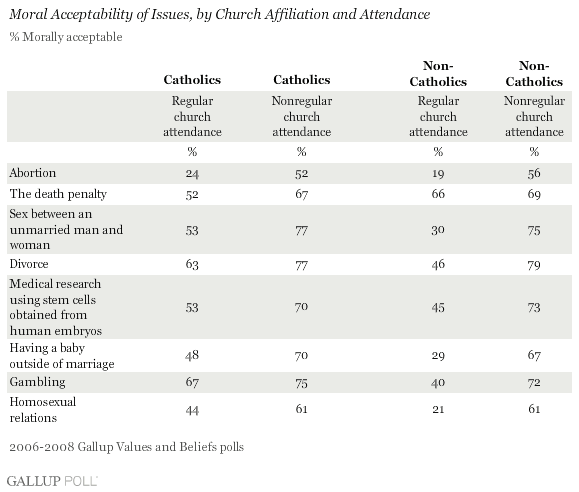The weekly report on research and demographics of the secular movement
by Julie Esris
Same-sex couples and their allies in Ireland had reason to celebrate last week. In a national referendum, 62.1% of the voting population said ÔÇ£yesÔÇØ for the legalization of same-sex marriage. This means that IrelandÔÇÖs constitution will now be amended to define marriage as the union between two people, regardless of sex. It may seem a bit surprising that same-sex marriage is now legal in Ireland. After all, divorce was illegal until 1996, and abortion is still illegal under most circumstances. But after examining some polls, it may not be as surprising as one might think.
Oddly enough, studies have indicated that, despite the Catholic ChurchÔÇÖs official stance on issues such as stem-cell research, contraceptives and, yes, same-sex marriage, individual Catholics are among the most liberal Christians. Unfortunately, the most comprehensive polls around these issues were conducted with Americans, but the information may still prove valuable. A 2009 Gallup poll revealed that 62% of American Catholics are slightly more likely than non-Catholics to support stem-cell research. 71% of Catholics find divorce morally acceptable, as opposed to 66% of non-Catholics. 67% of Catholics versus 57% of non-Catholics believe that sex between an unmarried man and unmarried woman is moral. 61% of Catholics versus 52% of non-Catholics believe that having a baby outside of wedlock is okay. 54% of Catholics find homosexual relations morally acceptable, versus 45% of non-Catholics. Another issue, the death penalty, is often positively correlated with religious adherence. However, only 61% of Catholics support the death penalty, whereas 68% do not. The only issue examined that Catholics were less likely to support than non-Catholics was abortion, but only slightly so: 40% versus 41%.
Of course, when comparing regular churchgoing Catholics to non-churchgoing Catholics, the numbers are quite different: the acceptability of the aforementioned issues is much lower for regular churchgoing Catholics, even, strangely enough, in regards to the death penalty. However, non-churchgoing American Catholics are still more liberal on these issues than churchgoing non-Catholics. Abortion is morally acceptable for 52% of non-churchgoing Catholics versus 19% of churchgoing non-Catholics, 77% versus 30% on the moral acceptability of sex between an unmarried man and woman, 77% versus 46 % on the question of divorce, 70% versus 45% on stem-cell research, 70% versus 29% on having a baby outside of wedlock, and 61% versus 29% on homosexual relations. Moral acceptability of the death penalty is very similar between churchgoing Catholics and non-churchgoing non-Catholics, at 67% versus 66%.

A 2014 Pew study closely corroborates the Gallup data on CatholicsÔÇÖ stance on homosexuality, revealing that American Catholics are among the least likely group of Christians to think that homosexuality is sinful, at only 44%. Unfortunately, a major issue with this poll and the Gallup poll is that they only surveyed American Catholics, and there was no comprehensive report to be found about Irish CatholicsÔÇÖ stance on homosexuality. However, a study released in 2011 indicates that almost half (47%) of Irish Catholics have an unfavorable view of the Irish Catholic church, possibly because of the recent sex-abuse scandals that have occurred in Ireland and elsewhere. 24% held a favorable view, and another quarter had no view either way (It is tempting to consider whether similar disillusionment of the Catholic church is also largely responsible for American CatholicsÔÇÖ more liberal stances on moral issues). Additionally, research has shown that the degree of religiosity has significantly dropped in Ireland, and that it is among the least religious nations. In fact, a study released in 2012 revealed that 78% of self-identified Irish Catholics do not actually adhere to Catholic teachings, and only 34% even go to church at all. Only 18% of churchgoers go to church regularly.
Ireland is clearly becoming less and less religious, despite the illegality of abortion and divorce only having been legalized recently. While some archaic laws remain, the outcome of the referendum on same-sex marriage strongly suggests that lawmakers and the general population hold very different views. It is likely that same-sex marriage was legalized in Ireland, not because of decisions of lawmakers but because of decisions of the liberal, irreligious, only-nominally-Catholic people. Perhaps same-sex marriage would not have been legalized had the decision been made by politicians and not in a national vote.
